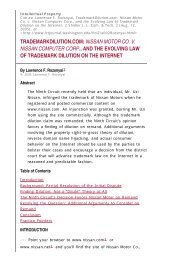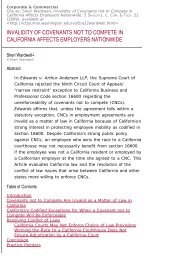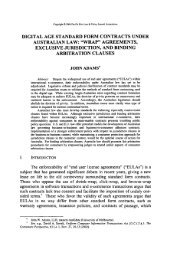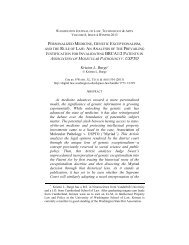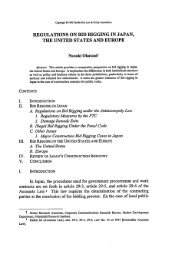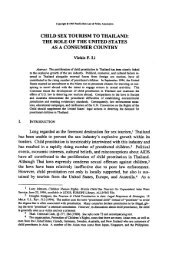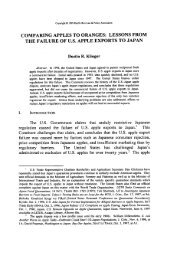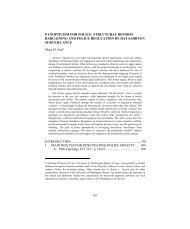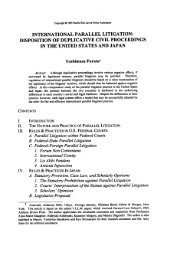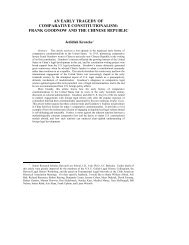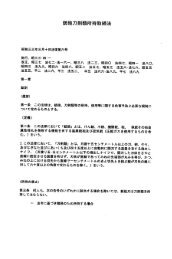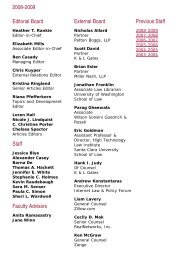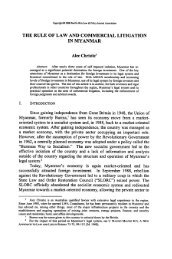the islamic legal system in singapore - University of Washington
the islamic legal system in singapore - University of Washington
the islamic legal system in singapore - University of Washington
You also want an ePaper? Increase the reach of your titles
YUMPU automatically turns print PDFs into web optimized ePapers that Google loves.
164 PACIFIC RIM LAW & POLICY JOURNAL VOL. 21 NO. 1<br />
II.<br />
THE EVOLVING ROLE OF ISLAMIC LAW IN SINGAPORE<br />
The roots <strong>of</strong> S<strong>in</strong>gapore’s plural <strong>legal</strong> <strong>system</strong> can be traced back to<br />
when S<strong>in</strong>gapore was a British colony. 5 Until 1880, <strong>the</strong> British embraced a<br />
policy <strong>of</strong> laissez-faire with respect to Muslim ritual and Muslim personal<br />
law <strong>in</strong> S<strong>in</strong>gapore. 6 This was encapsulated <strong>in</strong> a set <strong>of</strong> rules promulgated by<br />
Sir Stamford Raffles <strong>in</strong> 1823 before he left S<strong>in</strong>gapore: “In all cases<br />
regard<strong>in</strong>g <strong>the</strong> ceremonies <strong>of</strong> religion and marriages and <strong>the</strong> rules <strong>of</strong><br />
<strong>in</strong>heritance, <strong>the</strong> laws and custom <strong>of</strong> <strong>the</strong> Malays will be respected, where <strong>the</strong>y<br />
shall not be <strong>in</strong> contrary to reason, justice or humanity.” 7 In keep<strong>in</strong>g with this<br />
general pr<strong>in</strong>ciple, <strong>the</strong> Second Charter <strong>of</strong> Justice <strong>of</strong> 1826 conta<strong>in</strong>ed a caveat<br />
that, while English Law was to be applied <strong>in</strong> S<strong>in</strong>gapore, it could be modified<br />
to suit <strong>the</strong> religious beliefs and customs <strong>of</strong> <strong>the</strong> local <strong>in</strong>habitants. 8<br />
Over <strong>the</strong> n<strong>in</strong>eteenth and twentieth centuries, laws govern<strong>in</strong>g Muslims<br />
<strong>in</strong> S<strong>in</strong>gapore and <strong>the</strong> Straits Settlements more broadly developed out <strong>of</strong> a<br />
complex comb<strong>in</strong>ation <strong>of</strong> judicial precedent and statutory <strong>in</strong>tervention. 9<br />
Hawah v. Daud is <strong>the</strong> earliest reported judicial decision <strong>in</strong> which a court<br />
refused to apply British common law to Muslims <strong>in</strong> S<strong>in</strong>gapore and <strong>in</strong>stead<br />
applied what that court understood to be “Islamic law.” 10 In this case, <strong>the</strong><br />
Court <strong>of</strong> Judicature <strong>of</strong> Pr<strong>in</strong>ce <strong>of</strong> Wales Island, S<strong>in</strong>gapore and Malacca<br />
modified <strong>the</strong> English common law rule under which a woman’s property<br />
automatically became her husband’s upon marriage, as she no longer<br />
possessed capacity to hold property, thus allow<strong>in</strong>g Muslim women to reta<strong>in</strong><br />
<strong>the</strong> capacity <strong>of</strong> hold<strong>in</strong>g property <strong>in</strong> <strong>the</strong>ir own names upon marriage as well<br />
as entitl<strong>in</strong>g <strong>the</strong>m to a share <strong>of</strong> property <strong>in</strong> <strong>the</strong> event <strong>of</strong> divorce. 11<br />
The subsequent enactment <strong>of</strong> <strong>the</strong> 1880 Mahomedan Marriage<br />
Ord<strong>in</strong>ance <strong>in</strong> S<strong>in</strong>gapore was a landmark <strong>in</strong> that “for <strong>the</strong> first time, <strong>the</strong> British<br />
5<br />
The Second Charter <strong>of</strong> Justice was issued by <strong>the</strong> Crown on November 27, 1826 (extend<strong>in</strong>g <strong>the</strong><br />
jurisdiction <strong>of</strong> <strong>the</strong> Court <strong>of</strong> Judicature <strong>of</strong> Pr<strong>in</strong>ce <strong>of</strong> Wales’ Island to <strong>the</strong> two o<strong>the</strong>r territories <strong>of</strong> <strong>the</strong> Straits<br />
Settlements, S<strong>in</strong>gapore and Malacca). While English law was adopted as <strong>the</strong> basic law relat<strong>in</strong>g to<br />
marriages <strong>in</strong> S<strong>in</strong>gapore, a caveat was <strong>in</strong>cluded allow<strong>in</strong>g for <strong>the</strong> development <strong>of</strong> personal law based on<br />
religious beliefs and customs <strong>of</strong> <strong>the</strong> local <strong>in</strong>habitants—H<strong>in</strong>dus, Jews, and Muslims.<br />
6<br />
The Straits Settlements Mahomedan Marriage Ord<strong>in</strong>ance, enacted <strong>in</strong> 1880, was <strong>the</strong> earliest statute<br />
<strong>in</strong> Muslim law <strong>in</strong> S<strong>in</strong>gapore.<br />
7<br />
MOSHE YEGAR, ISLAM AND ISLAMIC INSTITUTIONS IN BRITISH MALAYA: POLICIES AND<br />
IMPLEMENTATION (1979).<br />
8<br />
HALSBURY’S LAWS OF SINGAPORE: FAMILY LAW 12 (2006).<br />
9<br />
For more on <strong>the</strong>se historical developments, see M.B. HOOKER, ISLAMIC LAW IN SOUTH-EAST ASIA<br />
84-122 (1984).<br />
10<br />
(1868) SLR Leic 253. In this case, which was heard <strong>in</strong> 1865, <strong>the</strong> husband had taken possession <strong>of</strong><br />
<strong>the</strong> title deeds <strong>of</strong> <strong>the</strong> wife’s property and <strong>the</strong>n divorced her under Muslim law. Id. She sued him for <strong>the</strong><br />
recovery <strong>of</strong> her property. Under <strong>the</strong> <strong>the</strong>n prevail<strong>in</strong>g common law, <strong>the</strong> husband became entitled to all his<br />
wife’s property upon marriage. Id.<br />
11<br />
HALSBURY’S LAWS OF SINGAPORE, supra note 8.



